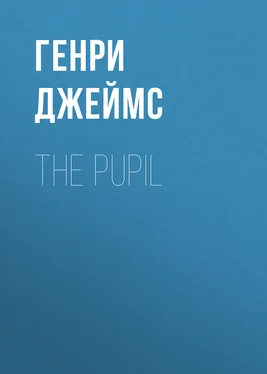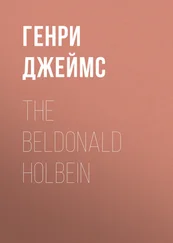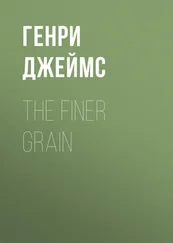Генри Джеймс - The Pupil
Здесь есть возможность читать онлайн «Генри Джеймс - The Pupil» — ознакомительный отрывок электронной книги совершенно бесплатно, а после прочтения отрывка купить полную версию. В некоторых случаях можно слушать аудио, скачать через торрент в формате fb2 и присутствует краткое содержание. Жанр: foreign_prose, foreign_antique, на английском языке. Описание произведения, (предисловие) а так же отзывы посетителей доступны на портале библиотеки ЛибКат.
- Название:The Pupil
- Автор:
- Жанр:
- Год:неизвестен
- ISBN:нет данных
- Рейтинг книги:5 / 5. Голосов: 1
-
Избранное:Добавить в избранное
- Отзывы:
-
Ваша оценка:
- 100
- 1
- 2
- 3
- 4
- 5
The Pupil: краткое содержание, описание и аннотация
Предлагаем к чтению аннотацию, описание, краткое содержание или предисловие (зависит от того, что написал сам автор книги «The Pupil»). Если вы не нашли необходимую информацию о книге — напишите в комментариях, мы постараемся отыскать её.
The Pupil — читать онлайн ознакомительный отрывок
Ниже представлен текст книги, разбитый по страницам. Система сохранения места последней прочитанной страницы, позволяет с удобством читать онлайн бесплатно книгу «The Pupil», без необходимости каждый раз заново искать на чём Вы остановились. Поставьте закладку, и сможете в любой момент перейти на страницу, на которой закончили чтение.
Интервал:
Закладка:
“He’s a genius—you’ll love him!” were words that recurred to our aspirant before the Friday, suggesting among many things that geniuses were not invariably loveable. However, it was all the better if there was an element that would make tutorship absorbing: he had perhaps taken too much for granted it would only disgust him. As he left the villa after his interview he looked up at the balcony and saw the child leaning over it. “We shall have great larks!” he called up.
Morgan hung fire a moment and then gaily returned: “By the time you come back I shall have thought of something witty!”
This made Pemberton say to himself “After all he’s rather nice.”
CHAPTER II
On the Friday he saw them all, as Mrs. Moreen had promised, for her husband had come back and the girls and the other son were at home. Mr. Moreen had a white moustache, a confiding manner and, in his buttonhole, the ribbon of a foreign order—bestowed, as Pemberton eventually learned, for services. For what services he never clearly ascertained: this was a point—one of a large number—that Mr. Moreen’s manner never confided. What it emphatically did confide was that he was even more a man of the world than you might first make out. Ulick, the firstborn, was in visible training for the same profession—under the disadvantage as yet, however, of a buttonhole but feebly floral and a moustache with no pretensions to type. The girls had hair and figures and manners and small fat feet, but had never been out alone. As for Mrs. Moreen Pemberton saw on a nearer view that her elegance was intermittent and her parts didn’t always match. Her husband, as she had promised, met with enthusiasm Pemberton’s ideas in regard to a salary. The young man had endeavoured to keep these stammerings modest, and Mr. Moreen made it no secret that he found them wanting in “style.” He further mentioned that he aspired to be intimate with his children, to be their best friend, and that he was always looking out for them. That was what he went off for, to London and other places—to look out; and this vigilance was the theory of life, as well as the real occupation, of the whole family. They all looked out, for they were very frank on the subject of its being necessary. They desired it to be understood that they were earnest people, and also that their fortune, though quite adequate for earnest people, required the most careful administration. Mr. Moreen, as the parent bird, sought sustenance for the nest. Ulick invoked support mainly at the club, where Pemberton guessed that it was usually served on green cloth. The girls used to do up their hair and their frocks themselves, and our young man felt appealed to to be glad, in regard to Morgan’s education, that, though it must naturally be of the best, it didn’t cost too much. After a little he was glad, forgetting at times his own needs in the interest inspired by the child’s character and culture and the pleasure of making easy terms for him.
During the first weeks of their acquaintance Morgan had been as puzzling as a page in an unknown language—altogether different from the obvious little Anglo-Saxons who had misrepresented childhood to Pemberton. Indeed the whole mystic volume in which the boy had been amateurishly bound demanded some practice in translation. To-day, after a considerable interval, there is something phantasmagoria, like a prismatic reflexion or a serial novel, in Pemberton’s memory of the queerness of the Moreens. If it were not for a few tangible tokens—a lock of Morgan’s hair cut by his own hand, and the half-dozen letters received from him when they were disjoined—the whole episode and the figures peopling it would seem too inconsequent for anything but dreamland. Their supreme quaintness was their success—as it appeared to him for a while at the time; since he had never seen a family so brilliantly equipped for failure. Wasn’t it success to have kept him so hatefully long? Wasn’t it success to have drawn him in that first morning at déjeuner, the Friday he came—it was enough to make one superstitious—so that he utterly committed himself, and this not by calculation or on a signal, but from a happy instinct which made them, like a band of gipsies, work so neatly together? They amused him as much as if they had really been a band of gipsies. He was still young and had not seen much of the world—his English years had been properly arid; therefore the reversed conventions of the Moreens—for they had their desperate proprieties—struck him as topsy-turvy. He had encountered nothing like them at Oxford; still less had any such note been struck to his younger American ear during the four years at Yale in which he had richly supposed himself to be reacting against a Puritan strain. The reaction of the Moreens, at any rate, went ever so much further. He had thought himself very sharp that first day in hitting them all off in his mind with the “cosmopolite” label. Later it seemed feeble and colourless—confessedly helplessly provisional.
He yet when he first applied it felt a glow of joy—for an instructor he was still empirical—rise from the apprehension that living with them would really be to see life. Their sociable strangeness was an intimation of that—their chatter of tongues, their gaiety and good humour, their infinite dawdling (they were always getting themselves up, but it took forever, and Pemberton had once found Mr. Moreen shaving in the drawing-room), their French, their Italian and, cropping up in the foreign fluencies, their cold tough slices of American. They lived on macaroni and coffee—they had these articles prepared in perfection—but they knew recipes for a hundred other dishes. They overflowed with music and song, were always humming and catching each other up, and had a sort of professional acquaintance with Continental cities. They talked of “good places” as if they had been pickpockets or strolling players. They had at Nice a villa, a carriage, a piano and a banjo, and they went to official parties. They were a perfect calendar of the “days” of their friends, which Pemberton knew them, when they were indisposed, to get out of bed to go to, and which made the week larger than life when Mrs. Moreen talked of them with Paula and Amy. Their initiations gave their new inmate at first an almost dazzling sense of culture. Mrs. Moreen had translated something at some former period—an author whom it made Pemberton feel borné never to have heard of. They could imitate Venetian and sing Neapolitan, and when they wanted to say something very particular communicated with each other in an ingenious dialect of their own, an elastic spoken cipher which Pemberton at first took for some patois of one of their countries, but which he “caught on to” as he would not have grasped provincial development of Spanish or German.
“It’s the family language—Ultramoreen,” Morgan explained to him drolly enough; but the boy rarely condescended to use it himself, though he dealt in colloquial Latin as if he had been a little prelate.
Among all the “days” with which Mrs. Moreen’s memory was taxed she managed to squeeze in one of her own, which her friends sometimes forgot. But the house drew a frequented air from the number of fine people who were freely named there and from several mysterious men with foreign titles and English clothes whom Morgan called the princes and who, on sofas with the girls, talked French very loud—though sometimes with some oddity of accent—as if to show they were saying nothing improper. Pemberton wondered how the princes could ever propose in that tone and so publicly: he took for granted cynically that this was what was desired of them. Then he recognised that even for the chance of such an advantage Mrs. Moreen would never allow Paula and Amy to receive alone. These young ladies were not at all timid, but it was just the safeguards that made them so candidly free. It was a houseful of Bohemians who wanted tremendously to be Philistines.
Читать дальшеИнтервал:
Закладка:
Похожие книги на «The Pupil»
Представляем Вашему вниманию похожие книги на «The Pupil» списком для выбора. Мы отобрали схожую по названию и смыслу литературу в надежде предоставить читателям больше вариантов отыскать новые, интересные, ещё непрочитанные произведения.
Обсуждение, отзывы о книге «The Pupil» и просто собственные мнения читателей. Оставьте ваши комментарии, напишите, что Вы думаете о произведении, его смысле или главных героях. Укажите что конкретно понравилось, а что нет, и почему Вы так считаете.












